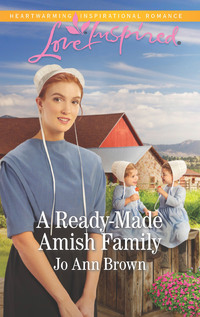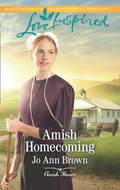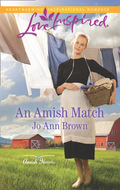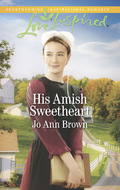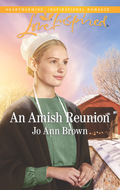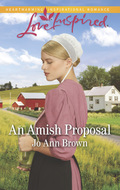Raamatut ei saa failina alla laadida, kuid seda saab lugeda meie rakenduses või veebis.
Loe raamatut: «A Ready-Made Amish Family»
The Amish Nanny
As temporary guardian of two sets of young and energetic twins, widowed minister Isaiah Stoltzfus needs a nanny immediately. Keeping the kids happy and safe while also trying to run his blacksmith shop is becoming impossible. So when Clara Ebersol arrives to help, Isaiah is relieved. Able to soothe, teach and delight the children, Clara feels like family. Love-shy Isaiah knows that recently jilted Clara isn’t looking for marriage, either. But with matchmakers—including four young kinder—on the job, Isaiah and Clara may soon find their hands clasped in matrimony.
“The kinder consider you part of their lives,” Isaiah said.
“But a temporary part.”
“Ja.”
“Isaiah, what would you have me do? Treat the twins as if they’re my job and nothing more?” Clara shook her head with a regretful smile. “I can’t. You can’t, either. You were wunderbaar with Nettie Mae tonight, convincing her the glasses made her special.”
“I think she’s special, so why shouldn’t she?”
“And that is what makes you special, Isaiah Stoltzfus. I’m going to say something that you probably don’t want to hear, but, Isaiah, your friends are right. You need to think of marrying because you’re a very gut daed.”
“That’s not the reason to get married.”
“You’re a gift to these kinder. They know it, too.”
“But I’m not their daed.”
“You are. At least temporarily.”
Coming to his feet, he knew he needed to put an end to this conversation before it wandered from the twins to him and Clara. It would be such a small step, and one his heart was pushing him to take. No, he couldn’t. Not when he knew how temporary this situation was.
JO ANN BROWN has always loved stories with happy-ever-after endings. A former military officer, she is thrilled to have the chance to write stories about people falling in love. She is also a photographer, and she travels with her husband of more than thirty years to places where she can snap pictures. They live in Nevada with three children and a spoiled cat. Drop her a note at joannbrownbooks.com.
A Ready-Made Amish Family
Jo Ann Brown

MILLS & BOON
Before you start reading, why not sign up?
Thank you for downloading this Mills & Boon book. If you want to hear about exclusive discounts, special offers and competitions, sign up to our email newsletter today!
Or simply visit
Mills & Boon emails are completely free to receive and you can unsubscribe at any time via the link in any email we send you.
Fear thou not; for I am with thee: be not dismayed; for I am thy God: I will strengthen thee; yea, I will help thee; yea, I will uphold thee with the right hand of My righteousness.
—Isaiah 41:10
For Stephanie Giancola
It’s been more years than either of us want to admit since you sat down next to me at the first-timers’ orientation (or did I sit down next to you?), and I’ve been blessed to enjoy your friendship ever since. All hail the Queen!
Contents
Cover
Back Cover Text
Introduction
About the Author
Title Page
Bible Verse
Dedication
Chapter One
Chapter Two
Chapter Three
Chapter Four
Chapter Five
Chapter Six
Chapter Seven
Chapter Eight
Chapter Nine
Chapter Ten
Chapter Eleven
Chapter Twelve
Chapter Thirteen
Chapter Fourteen
Chapter Fifteen
Chapter Sixteen
Epilogue
Dear Reader
Extract
Copyright
Chapter One
Paradise Springs
Lancaster County, Pennsylvania
“You look like you could use help.”
When he heard the woman’s calm voice, Isaiah Stoltzfus wanted to shout out his thanks to God for sending someone when he’d lost complete control of the situation. One kind was using the bellows in his blacksmith’s shop to blow cold ashes everywhere, and two others clacked lengths of metal together like ancient knights holding sabers while a fourth kind sat on the stone floor and sobbed. In the past fifteen minutes, he’d learned the true meaning of being at his wits’ end. He’d never guessed four young kinder could make him want to throw his hands into the air and announce he was in over his head. He’d been sure the kinder would be interested in visiting his blacksmith shop, but he’d been wrong. After a single glance around the space, they’d been bored and looked for the mischief they seemed able to find anywhere. He needed to take them somewhere else and find a way to divert their energy.
As if he’d given voice to his thoughts, Nettie Mae, the sobbing three-year-old girl sitting on his left boot, pressed her head against his leg and said, “Wanna go home, Onkel Isaiah. Go home now.”
Before he could answer either Nettie Mae or the woman, a cloud of dust exploded out of his unlit forge. He sneezed and waved it away. The other three-year-old girl was pumping harder and harder until a wheezing warning sound came out of the leather bellows. He opened his mouth to tell Nettie Mae’s twin, Nancy, to stop before she broke something, but one of the five-year-old boys who’d been poking at each other with the metal staffs yelped in pain and began crying.
Isaiah took a lumbering step toward the boys, hobbled by Nettie Mae, who clung like a burr to his trousers. How could he have lost control over four preschoolers so quickly?
The task wasn’t one for a man who’d never had kinder of his own. Maybe if Rose hadn’t died soon after they married and they’d had a boppli, it would be easier to anticipate what the youngsters might do next. The Beachy kinder were active and inquisitive, but every time he thought about scolding them, he recalled how they’d lost their parents two weeks ago. He didn’t want to upset them more, yet somehow every situation escalated into pandemonium.
But the woman who had been a silhouette in the doorway didn’t seem to have the same qualms. Without a single word, she walked into his smithy as if she’d been there dozens of times. A flash of sunlight danced on her lush, red hair, which was pulled back beneath her black bonnet. Her brown eyes glanced in his direction before she focused on the kinder. She plucked the shafts out of the boys’ hands and scooped their sister off the cold forge in a single motion, scattering ashes across her own dark blue dress. Placing the metal bars on a nearby table, she settled Nancy on her hip and knelt in front of the boys.
“Where does it hurt?” she asked one twin—Andrew, Isaiah noted—as she wiped tears from his pudgy cheeks and almost dislodged his straw hat.
“Ouch,” the towhead said, pointing to his right thumb that was already bright red.
Isaiah watched in amazement as the woman cradled the little boy’s hand as she ran a fingertip along his thumb. When the kind flinched, she murmured something too low for Isaiah to hear, but Andrew must have understood because he nodded, his eyes wide and filled with more tears.
“I don’t think it’s broken,” the woman said in the same serene voice, but loud enough so Isaiah could hear. “And I suspect as soon as little minds are focused on other things, the bruise will be forgotten. However, just in case, we should watch it over the next couple of days.”
“We?” Isaiah asked, his voice rising on the single word.
“You are Isaiah Stoltzfus, aren’t you?” She looked at the youngsters, then him. No doubt she was thinking there couldn’t be another overwhelmed man with two sets of twins wrecking his smithy in Paradise Springs.
“Ja. Who are you?”
“Clara Ebersol.”
“You are Clara Ebersol?” He shouldn’t stare, but he couldn’t help himself.
As she set Nancy on the floor and came to her feet, he held out his hand to help her. She must not have seen it, because she didn’t take it. When she was standing, he was startled to realize he didn’t have to look down far to meet her gaze. She was, he noticed for the first time, very tall for an Amish woman, because he wasn’t a short man. None of the Stoltzfus brothers were, but her eyes were less than a handbreadth below his. She was also lovely—something he had already noticed—possessing a redhead’s porcelain complexion. Not a single freckle marred her cheeks or dappled her nose.
He forced his eyes to shift away, glad nobody else was there. If he as much as talked to a woman for more than a minute, someone mentioned she would make him a gut wife. Everyone seemed eager to get their widowed minister married. Finding him staring at Clara Ebersol would have given the district’s matchmakers cause to start sticking their well-meaning noses into his life again.
“Weren’t you expecting me?” Clara stroked Andrew’s hair, and the little boy leaned his head against her skirt. “Your brother Daniel learned I was looking for a job, and he asked me if I’d be willing to help you take care of these kinder. He said I’d find you here.” For the first time, her composure showed a faint crack as she looked at him again. “Didn’t he tell you?”
“Ja, he told me.”
When Daniel had stopped at the Beachys’ house on his way home a couple of nights ago, he’d been pleased to tell Isaiah that he’d found someone to help take care of the twins. Isaiah had been grateful when Daniel had said he’d talked to Clara Ebersol himself, and she seemed perfect for the job. Arrangements had been made for her to meet Isaiah at the smithy today, because he’d hoped to finish a few tasks. But what Daniel had failed to mention—and Isaiah had never thought to ask about—was that Clara Ebersol was not a well-experienced grossmammi who’d already raised a household of kinder. She was a lovely young woman. Was his brother, who’d recently fallen in love and found a family, matchmaking? That was the only reason Isaiah could think of why his brother hadn’t mentioned Clara’s age. If he had to guess, Isaiah would say she must be close to his thirty years.
Or had Daniel told him?
Isaiah wasn’t sure he could recall anything during the past two weeks accurately. Maybe if he got a gut night’s sleep, he’d be able to think. Every thought had to battle against the appalling memories of his friends’ funeral playing over and over through his mind, refusing to be forgotten.
Reaching into the pocket of her black apron, Clara drew out four lollipops. The twins focused on her hand.
“I’ve got a red, an orange, a yellow and a green.” She raised her head and asked, “Do they know their colors?”
Again Isaiah wasn’t quick enough to answer, as Ammon, usually the quietest one, shouted, “Want that one!” He pointed to the red lollipop.
She squatted again and made sure each kind got the lollipop he or she wanted. Taking the cellophane off each piece of candy, she led the two sets of twins out of the smithy. She looked around, unsure where to have them eat their suckers.
The space between the long, low building that housed the Stoltzfus Family Shops and Isaiah’s smithy was more cramped with each passing day. His brother Joshua’s buggy shop was outgrowing its space. Last week, Joshua and his two older sons had spent hours setting up a canopy where buggies could be parked out of the weather until Joshua had time to fix them.
“How about over there?” he asked, pointing to the back step of the grocery store his brother Amos ran.
“Perfect.” Motioning for the kinder to follow, she waited for each of them to select a spot on the concrete step. Once they were settled, the girls on one side and the boys on the other by unspoken consent, their tears and mischief were momentarily forgotten.
“Let’s talk,” he said, motioning for her to come back to him.
She hesitated, then walked to where he stood by the smithy’s door. For a second, he wondered if she preferred the kinder’s company to his. Telling himself not to be foolish, because she didn’t know any of them, he recognized he wasn’t in any condition to make judgments. He was so tired he had trouble stringing more than three words together.
Quietly so her voice wouldn’t reach the kinder, Clara said, “Your brother Daniel told me that they’re orphans. That’s terribly sad.”
He nodded, words sticking in his tight throat. It had been only two weeks ago that he’d been roused out of bed in the middle of the night and learned his best friend Melvin Beachy had been killed along with Melvin’s wife, Esta. They’d been traveling in an Englisch friend’s truck coming home from an auction when something went wrong. The truck had gone through a guardrail and rolled, killing all three and leaving four small kinder without parents.
Nobody had been prepared for their deaths, but the whole community came together to help with the funeral. In the past two weeks, he hadn’t made a single meal for the Beachy twins, because at least one person dropped by each day with casseroles and pies and fresh bread. As they had when his wife had died.
“I heard one of the girls call you ‘onkel,’” Clara went on when he didn’t answer.
Relieved to be jerked out of his grim thoughts, he nodded again. “It’s an honorary title. Their daed was my best friend, so the twins grew up with me around.” He was surprised how gut it felt to talk about Melvin instead of avoiding any mention of either him or Esta as he had since their funeral. His family had been trying to tiptoe around the subject. Their efforts not to upset him were a constant reminder of what he’d lost. “Melvin asked me, after the girls were born, to be the kinder’s guardian in case something happened to him and Esta.”
“They don’t have any other family?”
“There are Melvin’s parents and Esta’s sister. But they are out of the country, working with Mennonite missions. The kinder’s grandparents, Melvin’s parents, are in Ghana, and Esta’s sister is in Chile. It’ll take at least a month before they can return to Paradise Springs. Maybe longer for their aenti because a recent earthquake along the Chilean coast tore up many of the roads in the area where she’s serving.”
She smiled. “So you have become their temporary daed.”
He wished he could smile, but grief weighed too heavily for his lips. “I moved into their house to take care of them until someone from their real family gets here. I figured it’d be easier for them than moving to my house.”
He didn’t add that disaster had followed disaster while he tried to keep up with the young and confused kinder who didn’t understand why their parents had failed to come home as they’d promised. It hadn’t taken more than a couple of days for Isaiah to realize he couldn’t oversee them and run his blacksmithing business and fulfill his duties as a minister in the district. Neighbors and his family had been helping with the chores on the farm and in the house. Now that Clara was going to be at the house, she would tend to those jobs, and he could work in the barn without having the kinder out there with him. Keeping an eye on the little kids while trying to milk the family’s dozen cows had been close to impossible.
“I should get to know them.” She walked to the kinder and knelt in front of them.
Isaiah stayed where he was. The soft murmur of her voice drifted to him, but not her words. She seemed uncomfortable with him. If that was so, why had she taken the job? Again, he chided himself. He was in no condition to judge anyone or anything. If she could calm the kinder with such ease, then why would he care if she’d rather spend time with the twins?
But he did.
You’re not thinking clearly. Be glad you’ve got help. And he was. Hoping he didn’t fall asleep on his feet, he turned to the smithy and the task of cleaning the mess the youngsters had made.
* * *
Clara looked from the kinder who were enjoying their lollipops to Isaiah Stoltzfus as he walked with slow, heavy steps into the blacksmith’s shop. The man was exhausted. He carried a massive burden of fatigue on his shoulders, and, if the half-circles under his eyes got any darker, he would look as if he were part raccoon. She guessed that when he wasn’t so tired he was a gut-looking man. His brother had mentioned Isaiah was a widower. The beard he had started when he married remained thin in spots, or maybe its white-blond hair was so fine it was invisible at some places along his jaw. Above his snowy brows, the hair dropping over his forehead was several shades darker, a color she’d heard someone describe as tawny.
He seemed like a nice guy, but nice guys weren’t always what they seemed. She’d learned that the hardest way. She didn’t intend to make the mistake again.
Not getting too close or too involved was her plan. She would help him with the twins, and when their aenti or grandparents returned, she’d leave with a smile and her last paycheck. By then, maybe she would have figured out what she wanted to do in the future. It wasn’t going to revolve around a man, especially a gut-looking one who could twist her heart around his little finger and break it.
A sharp crunch drew Clara’s attention to the kinder. The two sets of twins looked enough alike to be quads. They had pale blond hair, the girls’ crooked braids barely containing their baby fine tresses that floated like bits of fog. Another crunch came, and she realized one boy was chewing on his lollipop.
“Are those candies gut?” she asked, already seeing differences between the two boys. The boy with the injured finger had a cowlick that lifted a narrow section of his bangs off his forehead, and the other one had darker freckles.
“Ja,” said one of the girls.
“I am Clara.” She smiled as she took the empty sticks held out to her. “What are your names?”
The wrong question because the kinder all spoke at once. It took her a few moments to sort out that Andrew was the boy with the bruised finger and the other boy was Ammon. The toddler who had been climbing on the forge was Nancy, and her twin was named Nettie Mae.
She led them to a rain barrel at the end of the building and washed their hands and faces. Each one must have given the others a taste of his or her lollipop, because their cheeks had become a crazy quilt of red, orange, yellow and green. She cleaned them as best she could, getting off most of the stickiness.
As she did, first one kind, then the next began to yawn. She wondered if they were sleeping any better than Isaiah was. Or maybe they needed a nap.
Clara felt like a mother duck leading her ducklings as she walked to the blacksmith shop. A light breeze rocked the sign by the door that read Blacksmith. Peeking past the door, she saw Isaiah checking the bellows, running his fingers along the ribs. Did he fear Nancy’s enthusiasm had damaged them?
Though she didn’t say anything and the kinder remained silent, he looked up. He attempted a smile, and she realized what a strain it must be when he’d lost two dear friends.
“Is it all right?” she asked. When his forehead threaded with bafflement, she added, “The bellows?”
“They seem to be, but I won’t know until I fire the forge.”
“If it’s okay with you, I’ll take the twins home while you do what you need to here.”
“I should show you where—”
“I think I can find my way around a plain kitchen,” she said. She didn’t want him to think she was eager to go, though she was. The fact she’d noticed how handsome he was had alarms ringing in her head. After all, her former fiancé, Lonnie Wickey, had been nice to look at, too.
“I’m sure you can,” he said after she’d urged the kinder to get in her buggy. “But you should know the pilot light on the stove and the oven isn’t working. Do you know how to light one?”
“Ja. Our old stove was like that.” She lifted Nettie Mae, the littlest one, into the buggy. “Did you have something planned for supper?”
“We’ve been eating whatever is in the fridge. I appreciate you coming to help, Clara.” He glanced at where the kinder were climbing into her buggy and claiming seats. “Can you stay until their grandparents or their aenti get here?”
“I can stay for as long as you need me to help with the kinder.” She didn’t add she was glad to get away from her daed, who found fault with everything she did. As he had for as long as she could remember. Doing a gut job for Isaiah could be the thing to prove to Daed she wasn’t as flighty and irresponsible as he thought. She had been as a kind, but she’d grown up. Her daed didn’t seem to realize that.
“Gut.” His breath came out in a long sigh, and she realized he was more stressed than she’d thought. “If it’s okay with you, I’ll finish some things here and get to the farm in a couple of hours. You don’t have to worry about milking the cows. I’ll do that after supper.”
“Take your time. I know you haven’t had much of it.”
He gave her a genuine smile, and her heart did a peculiar little lilt in her chest. She dampened her reaction.
“Danki,” he said. “It’s late, so getting set up for tomorrow is the best thing I can do. Firing the forge at this time in the afternoon would take too long. With you here to oversee the kinder, I’ll be able to finish the commission work that needs to be shipped by the end of next week.”
Curious what he was making, she nodded and walked to the buggy. She climbed in, pleased he didn’t offer her a hand in so that she didn’t have to pretend—again—she hadn’t seen his fingers almost in her face. She made sure the twins were settled, the girls on the front seat with her and the boys in the back where they could peer out the small rear window. Her two bags sitting on the floor between the seats wouldn’t be a problem for their short legs.
Clara drew in a deep breath as she reached for Bella’s reins. The bay shook her mane, ready to get to their destination after the hour-long drive from the Ebersol farm south of Paradise Springs. Clara was eager to be gone, too. Every turn of the buggy wheels took her toward her future, though she had no idea what that would be. The decisions would be hers, not some man’s who made her a pledge, then broke it a few months later.
She had expected the little ones to fall asleep to the rhythmic song of the horse’s iron shoes on the road, but getting into the buggy seemed to have revived them. When she glanced at the twins, she discovered four pairs of bright blue eyes fixed on her.
“You got kinder?” asked Nancy.
“No,” she said, glad her black bonnet hid her face from them. Try as she might, she hadn’t been able to keep her smile from wavering at the innocent question.
She had thought she would have a husband and be starting a family by now, but the man who had asked her to be his wife had married someone else in Montana without having the courtesy of telling her until after she’d found out from the mutual friend who had introduced them. Lonnie had come from Montana to visit Paradise Springs, and he’d courted her. Fool that she was, she’d believed his professions of love. Worse, he’d waited until he was married to write to her and break off their betrothal.
“I like you,” said Nettie Mae, leaning her head against Clara’s arm.
“I like you, too.” Clara was touched by the kind’s words. They were what she needed.
“I got a boppli.” She chewed on the end of her right braid.
“Will you show her to me when we get to your house?” Clara started to reach to pull the braid out of the kind’s mouth as she asked another question about Nettie Mae’s doll, then stopped herself. There was time enough to help the youngster end a bad habit later. Chiding her wouldn’t be a gut way to start with these fragile kinder.
The little girl nodded.
“Me, too,” Nancy announced as she jumped to her feet.
Clara drew the horse to a walk, then looked at the excited little girl. “It’s important we sit when we’re riding in a buggy.”
“Why?” both boys asked at the same time.
Worried that speaking about the dangers on the road might upset the twins and remind them of how their parents had died in a truck accident, she devised an answer she hoped would satisfy them. “Well, you see my horse? Bella is working very, very hard, and we don’t want to make it more difficult for her by bouncing around too much in the carriage.”
“Oh,” said a quartet of awed voices.
“Like horse,” Nancy said, sitting on the front seat again. “Pretty horse.”
“Ja. Bella is a pretty horse.” She slapped the reins and steered the carriage along the twisting road, making sure she watched for any vehicles coming over a rise at a reckless speed.
When a squirrel bounced across the road in front of them, the kids were as fascinated as if they’d never seen one before. They chattered about where it might live and what it might eat and if they could have one for a pet.
“It’s easy to catch a squirrel,” Clara said. “Do you know how?”
“How?” asked Andrew, folding his arms on the top of the front seat.
“Climb a tree and pretend you’re a nut.” She waited for the kinder to laugh at the silly riddle, but they didn’t.
Instead they became silent. The boys sat on the rear seat, and the girls clasped hands as Nettie Mae again began to chew on the end of her braid.
What had happened? They were old enough to understand the punch line, and she’d expected them to giggle or maybe groan. Not this unsettling silence.
“Where Onkel Isaiah?” Nettie Mae asked.
“Want Onkel Isaiah,” whined her twin.
“We’re going home to make supper for him,” Clara said, keeping her tone upbeat.
“Onkel Isaiah make supper,” Nettie Mae insisted.
“She’s right,” Andrew added. “Onkel Isaiah said he’d make supper until Grossmammi and Grossdawdi get home from ’freeca.”
Glad Isaiah had explained the kinder’s grandparents were in Ghana, Clara was able to understand the boy’s “’freeca” meant Africa. She struggled to hold on to her smile as she said, “But I offered to make supper tonight. It’s nice to share chores sometimes, isn’t it? Your onkel and I will be sharing the work.”
“I’ll help,” crowed Andrew at the top of his lungs.
“Me, too!” shouted his twin.
Before Clara could ask them to lower their voices, Nettie Mae began to pout. “Me too little.”
“Nonsense,” Clara replied. “My grossmammi says God has work for all his kinder, no matter if they’re young or old.” She turned the buggy at a corner, following the directions Daniel Stoltzfus had given her. “Sometimes it means taking care of the beasts in the fields or making a nice home for our families. Other times, it’s letting Him know we love Him. We can sing a song for God. Do you know ‘Jesus Loves the Little Children’?”
“Ja!” they shouted.
She put her finger to her lips, but was relieved that they hadn’t withdrawn as they had when she told the joke. “Do you know sometimes Jesus hears the song best if we sing quietly?”
“Really?” asked Andrew.
Already she could tell he was the one who spoke for his siblings. She suspected he was also their leader when they got into mischief.
“Ja,” she answered. “Jesus listens to what’s in our hearts, so when we sing quietly, it helps Him hear our hearts’ voices.”
Singing along with the youngsters, she watched for the lane leading to the Beachys’ farm. Her hopes were high this job would be the perfect way for her to have time to decide what she wanted to do with the rest of her life. The kinder were easy to be around...as long as she kept them entertained. Their onkel would be busy with work, so she probably wouldn’t see him other than at meals.
Driving up the lane toward the large white house with its well-kept barns set behind it, she imagined the first day her parents found money from her in their mailbox. She planned to send her pay home to her parents. Perhaps even Daed would be pleased with her efforts and acknowledge she wasn’t a silly girl any longer. There was a first time for everything. Wasn’t that what the old adage said?
